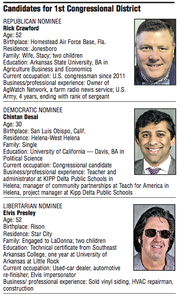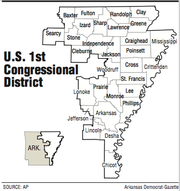In the Arkansas congressional district that skewed most heavily in favor of President Donald Trump, Chintan Desai was trying to introduce himself to voters one by one during an August catfish festival in Grady.
The voters there greeted the Democratic candidate with openness and a dose of skepticism, according to interviews with several.
The incumbent, U.S. Rep. Rick Crawford, a Republican from Jonesboro, has a nearly 14-to-1 fundraising advantage over Desai and has name recognition from four terms serving the 1st Congressional District, which spans 30 counties across the Delta and northeast Arkansas.
In a recent interview, Crawford predicted that the overtures by his Democratic opponent -- who is making just his second bid for public office -- would fall flat.
"He's grossly out of touch with the values of Arkansas voters if he's going to propose socialist ideas and expect to gain traction," Crawford said.
During a recent debate, the two sparred over the socialist label, with Crawford accusing Desai of having no plan for paying for his Medicare-for-all idea. That prompted Desai to retort that the congressman lacked "vision." (The debate also included the Libertarian candidate, Elvis Presley, who spent most of his time advocating for more casinos.)
Crawford opposed the American Health Care Act -- House Republicans' 2017 plan to repeal and replace the Patient Protection and Affordable Care Act -- saying it did not go far enough to dismantle the Barack Obama-era health care law.
Desai is quick to note that tens of thousands of Arkansans in the 1st District rely on the Affordable Care Act subsidies for their insurance under the state's expanded Medicaid program.
He also points to the issue of Chinese tariffs on soybeans, the result of Trump's ongoing trade war -- which Desai said Crawford is a "full-throated supporter" of -- to make his argument that Crawford has become out of touch with his district.
"A lot of people don't know Congressman Crawford," Desai said during a brief interview at the Grady Catfish Supper. "Most of the people we talk to don't know who he is, haven't met him."
One such voter, Paul Johnson, a retired farmer from Grady, was sitting under a tent canopy and slicing watermelons when he was approached by Desai. Afterward, Johnson told a reporter that he was sure he'd met Crawford in the past.
"I don't know [Desai]. I asked him if he liked Trump, and he didn't really answer; he gave a Bill Clinton answer," said Johnson, who described himself as an unequivocal supporter of the current president.
As for the congressional race at hand, Johnson said he was undecided.
"I vote for the man, not the party," he said.
While Crawford agreed that the issue of soybean tariffs "has been fairly consistent in people's minds," he said farmers were understanding of the administration's desire to confront Chinese trade policies. Meanwhile, U.S.-imposed tariffs on Chinese steel are a boon to steel manufacturers in northeast Arkansas, Crawford said.
"There's a willingness to endure this pain because [farmers] know in the long term, they're going to come off better," Crawford said.
The congressman said he took issue with how Desai was handling his campaign, accusing the Democrat of "being against everything."
After the debate last week, Crawford called out supporters of Desai -- who, while on the front row, laughed at some of the congressman's responses. "Your staff is a reflection of you," Crawford said.
Desai said the disruptive audience members were not on his staff, but he did offer an apology to the congressman.
"I should have said something then and there," Desai said. "That was not OK."
Crawford also has questioned Desai's motivations. He said Desai applied for a job at his office last year, when the Democrat was working as a project manager at KIPP Delta Public Schools in Helena-West Helena. Crawford's chief of staff later supplied a resume that he said Desai had sent to the office in May 2017.
Desai denied applying for a job -- none were open at the time -- and said he was interested in public service and had an initial conversation about working in constituent services that "didn't go anywhere."
On social media and in last week's debate, Desai knocked Crawford for not holding town hall-style meetings. The challenger has posted videos and photos touting his own efforts to crisscross the 30 counties in the district.
Crawford has in turn said he's "probably one of the more accessible members of Congress" and highlighted his own recent recognition, including a service award from the Arkansas Farm Bureau.
Born to an Indian-immigrant family in California, Desai moved to Helena-West Helena after college as part of the Teach for America program. In 2016, he ran unsuccessfully for a position on the Helena-West Helena City Council.
Crawford, the former owner of a farm radio news service, was first elected to Congress in 2010.
Presley, the Libertarian candidate, also has previous campaign experience, including running as a write-in candidate for governor in 2010. Speaking to reporters after the debate, he said he was just as serious about running now as he was then.
"I'm not a novelty candidate," Presley said. "I'm not a novelty when I'm onstage. I take my job seriously."
Back at the Ned Hardin Pecan Grove in Grady, Johnny Faulkner of England, who is an undecided voter and the manager of an agricultural equipment business, had this to say after shaking hands with Desai: "He did one thing right; he asked me for my vote, and Crawford didn't."
Early voting starts Oct. 22. Election Day is Nov. 6.
SundayMonday on 10/15/2018


